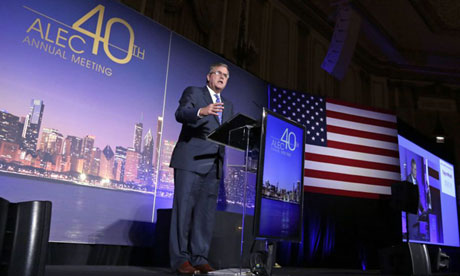ALEC and Its (Reluctantly) Newly-created Jeffersonian Project
The American Legislative Exchange Council (ALEC) has been in existence for over forty years– since 1973. In 1975, ALEC registered as a nonprofit organization. By the late 1980s, ALEC had begun to “actively solicit more input from private sector members” as the ALEC “task forces” became “model bill movers.”
Thus, by 1990, the current ALEC practice of involving corporate America in the drafting and promoting of legislation that suited corporate America– and having ALEC legislative members carry ALEC bills back to their respective statehouses– was in place.
In his December 2013 National Public Radio interview, reporter Ed Pilkington likens ALEC to a “dating service”:
ALEC is sort of almost a dating service between politicians at the state level, local elected politicians, and many of America’s biggest companies. It brings them together much as a dating service would do. It sits them in rooms behind closed doors where three times a year they come together to think about what should be the next wave of state-based legislation and they have presentations from the companies that say what they would like to see done legislatively in states right across America. Then they have a vote and the legislators begin. Hundreds of state legislators across America belong to ALEC and come to these meetings.
They begin to have a vote on what they’d like to do in the next state assembly session. And after the legislators have voted the companies get to vote and essentially they have a veto. If they don’t vote by at least 50 percent to approve a piece of legislation going forward, it doesn’t happen. If they think they do approve of it, it goes ahead and becomes a model bill, which is like a blueprint for a piece

